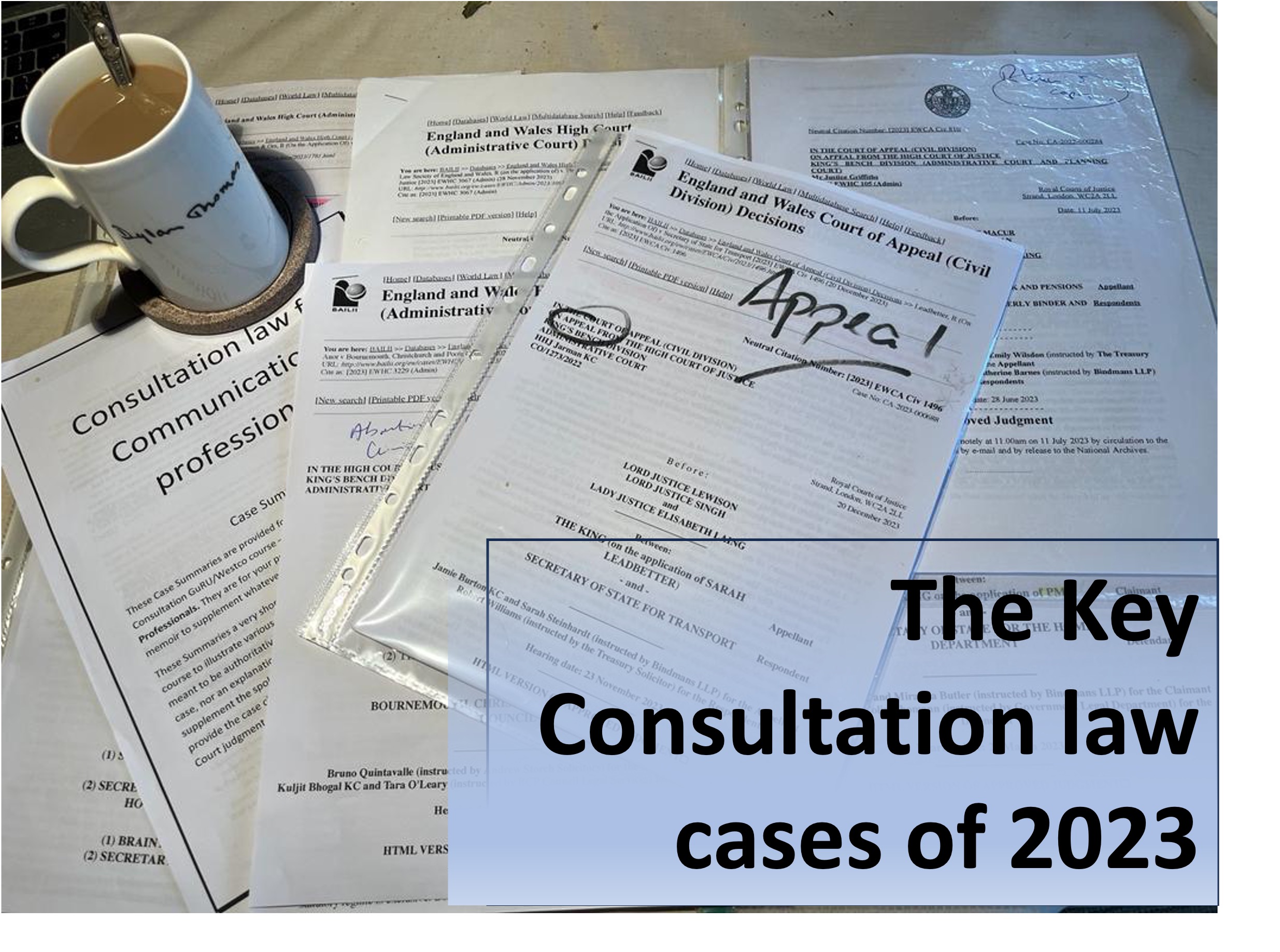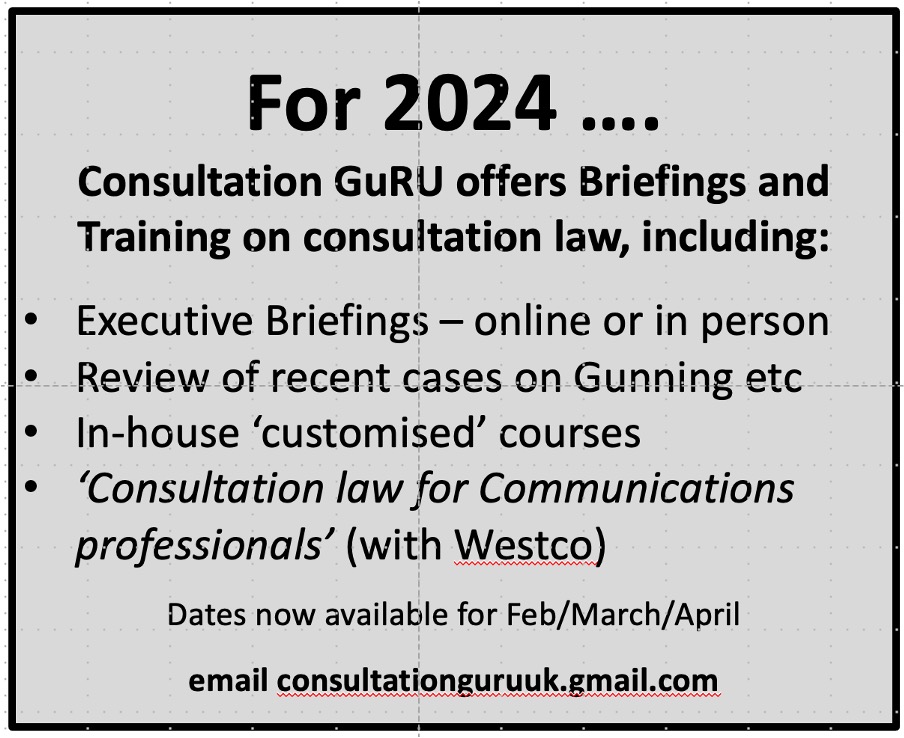This is Blog No 55
For those of us monitoring developments in the law of consultation, there have been over twenty relevant Judicial Reviews to consider in 2023.
About half of them involved local authorities in some way or another; the other half were mostly challenges to Government departments, several of which were embarrassing defeats for Ministers.

As often happens, about half the challenges succeed; the others fail. Who wins is seldom a reliable indicator of the significance of a case; much depends upon how the Judge interprets the applicable principles and the weight given to various forms of evidence.
2023 has done little to clarify the law of consultation. Even the application of the Gunning Principles has been thrown into confusion by some strange comments made by the Court of Appeal. And Judges have shown themselves tolerant of failures in consultation that might have persuaded many laymen that consultees had been treated unfairly. In the one case that went to the Supreme Court, a local authority consultation, whose failures was found defensible both by the High Court and the Court of Appeal, was eventually ruled unlawful. What might have happened if others had been re-visited by a more senior Court?
As judgments are handed down, I publish occasional commentaries on the most interesting cases. Consultation GuRU obviously has its focus on aspects that are of greatest relevance for those working in public engagement and consultation. At times, the consultation aspects may not be very important for the overall case; at other times, it is absolutely front and centre. Ultimately, professional advice will be needed, but, hopefully, www.consultationguru.co.uk provides a useful service in highlighting key messages from the Courts.
In approximately chronological order, these are the most relevant cases I have looked at in 2023, and why …
- The Holland Park School parents. A late 2022 case – considered in 2023, and significant because although the parents failed to persuade the Court that the ‘engagement’ was unlawful, the Judge assumed that the Gunning Principles applied, and effectively sets a precedent for the future interpretation of Guidance affecting school academies (See http://tinyurl.com/mr32tmz5)
- The Kerb Height Guidance case. Brought by Sarah Leadbetter, and confirmed that the revised Guidance on inclusive mobility had not been consulted upon properly. (Briefly covered in http://tinyurl.com/3fbfhr2j) Although the Court of Appeal refused to quash the Guidance, the initial finding re consultation holds.
- The Shropshire Council case at the Supreme Court. This overturned judgments that allowed the Council to grant planning permission for land which was subject to a statutory trust in favour of the local community for recreational purposes; the Council had failed to consult as required by a 1972 Act.
- The Sexual entertainments venues case in Bournemouth. Poor advice given to Councillors - that they could disregard some consultee responses relating to moral rather than site-specific objections to venue licenses. An otherwise satisfactory consultation became unlawful because key responses were not conscientiously considered (i.e. Gunning Four). (Full commentary http://tinyurl.com/e44cwth8)
- The Court of Appeal decision on Eveleigh – where it overturned the Binder decision of 2022, which had ruled against the Dept of Work & Pensions over its Disability strategy. Whilst preparing for it, they held a ‘consultation’ but when it failed to observe the Gunning Principles, tried to claim it was only a survey. The High Court disagreed (if it quacks like a duck … etc), and declared the consultation unlawful. But in 2023, the Court of Appeal overruled it and suggested that the circumstances where the Principles apply may be more restricted than previously thought. A critical commentary can be found at http://tinyurl.com/bdevmwfm
- ASLEF & other Unions v Sec of State for Business. The High Court quashed Regulations to enable recruitment of strike-replacement staff without consultation. The Government had sought to rely instead on a consultation six years earlier and whose output had never been published, but the Court ruled against it. (See http://tinyurl.com/bdevmwfm)
- The Anti-ULEZ London Boroughs v Mayor London. Five Councils failed in challenging the consultation on Sadiq Khan’s Ultra-low emissions zone, but the case highlighted the risk of obscure technical impact assessments and contested question drafting. (Full commentary in http://tinyurl.com/bh94sf5j)
- The Badger Culling case in Northern Ireland, where the Dept of Agriculture, Environment & Rural Affairs failed to disclose the methodology it used to select the preferred option of non-selective controlled shooting of badgers. (See commentary at http://tinyurl.com/jwuc8fz6)
- The Pickering Fisheries case. Potentially the most significant case as DEFRA was found to have provided inadequately specific information about its plans to improve water quality on a river-by-river basis as to enable a lawful consultation to take place. (Referred to in http://tinyurl.com/3fbfhr2j with further discussion soon)
- Bournemouth Christian Concern. A very recent judgment that considers a Public Space Protection Order to restrain the activities of those wishing to protest around an Abortion clinic. Campaigners failed to show that the Chief Constable had not been properly consulted in person.
There are others worth study, with specific messages applicable in planning, health and education environments. There are interesting cases on proposals for a massive solar farm, the accommodation of asylum seekers at ex RAF sites, and levels of legal aid. The law of consultation remains an active area of litigation with no shortage of prospective challenges to decisions where the adequacy of consultation is questioned.
During the forthcoming year, I expect to continue my focus on developments in this area and to provide Briefings and training for local authorities, the NHS and other public bodies and Government departments. With Westco, I expect to deliver a new course – Consultation law for Communications Professionals, and I expect to develop other focused variants in the coming weeks.
Rhion H Jones LL.B
Commentaries are prepared primarily to help consultation practitioners take account of developments in the law and to guide them on situations where legal advice should be sought. They are no substitute for reading Court judgments or studying statutory provisions or associated Guidance.

Leave a Comment
I hope you enjoyed this post. If you would like to, please leave a comment below.